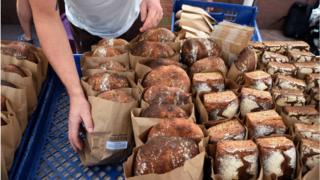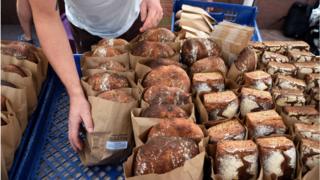Sourdough or sourfaux? Artisan bread label row erupts
Proposed rules could undercut bakers who make genuine sourdough bread, say campaigners. …

 Image copyright Getty Images
Image copyright Getty Images Sourdough bread has become a major food trend over the last few years, with loaves flying off the shelves at independent bakeries and cafes, often for high prices.
But with major supermarkets now getting in on the act, a row has broken out about what constitutes real sourdough and how it should be made.
It’s led one campaign group to dub the more commercial – and cheaper – products on offer at many retailers as “sourfaux”.
“We have no problem at all with a supermarket selling genuine sourdough. Just don’t cheat, don’t fool people,” said Chris Young, co-ordinator of The Real Bread Campaign.
Sourdough has been around in various forms for thousands of years. Proponents believe it is more nutritious and easier to digest than normal bread.
Known for its characteristic flavour and texture, it is made with live fermented cultures which act as a natural leavening agent and should not be made with baker’s yeast, according to Mr Young.
But this week, a coalition of five trade groups representing commercial bakers and restaurants across the country proposed a wider definition, in an industry code of practice designed to clarify the labelling on sourdough products.
In it, they acknowledge that any product calling itself “sourdough bread” should contain live/active cultures “as the principle leavening agent”.
But they also suggest that such a loaf may contain up to 0.2% of bakers’ yeast and certain “flour treatment agents”.
“Where space and skills are lacking, bakers have recourse to an increasing number of ingredients and raw materials that help to simplify the process,” the guidelines state.
The group – which included the Federation of Bakers, among others – has asked food agency Defra to endorse the code, which would be voluntary.
But the Real Bread Campaign warned the rules risked “undermining the integrity of the word sourdough, creating a sourfaux free-for-all”.
“When we started nine years ago, there were no sourdough loaves on supermarket shelves, they used to see it as elitist,” Mr Young told the BBC.
“Big firms now see there’s a demand. But rather than saying, ‘We will bake genuine sourdough and make it more accessible,’ they’ve said, ‘Stuff it, we don’t want to train our bakers or put in the time it takes to learn. We want to cut corners.'”
The sheer crust
The kind of independent bakeries represented by the Campaign for Real Bread can charge as much as much as £5-£6 for an artisan sourdough loaf in some UK cities.
By contrast, products labelled as sourdough bread retail for a fraction of the price in many supermarkets – and there is no law dictating how such bread should be made, as long as it meets relevant food standards.
However, a study by consumer watchdog Which? last year found that just four of 19 supermarket sourdough loaves it tested contained the traditional four ingredients: flour, water, salt and a live yeast starter culture.
Mr Young said people would potentially get an inferior taste and miss out on the health benefits. “This bread may cost less, but supermarkets may still be charging a premium for a non-premium product, which we think is unfair.”
The BBC asked the Craft Bakers Association, which is one of the groups backing the new code, for a comment.
Meanwhile, Gordon Polson, chief executive of the Federation of Bakers, said: “A draft of the Baking Industry Code of Practice for the Labelling of Sourdough Bread and Rolls has been presented to Defra.
“We look forward to discussing it with Defra as an important step in helping with labelling sourdough, following guidelines which have been established in other EU countries.”



